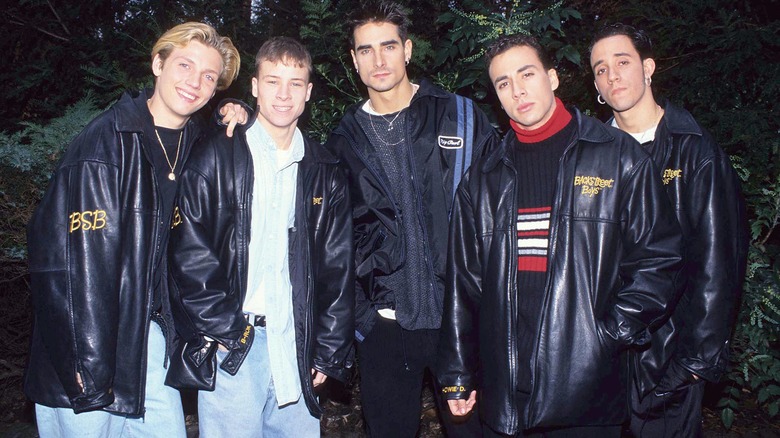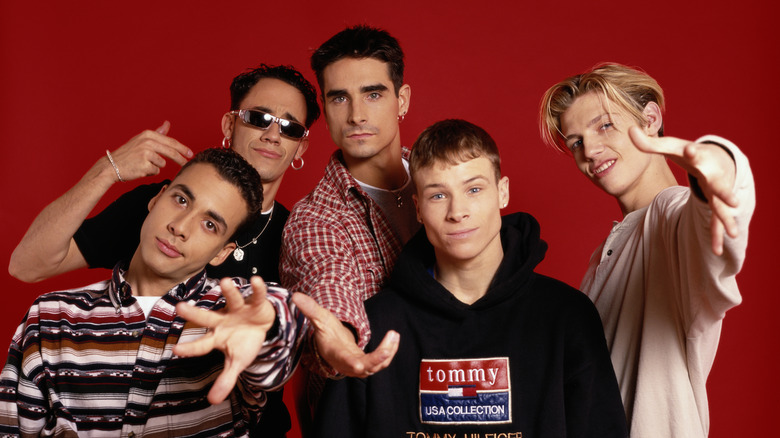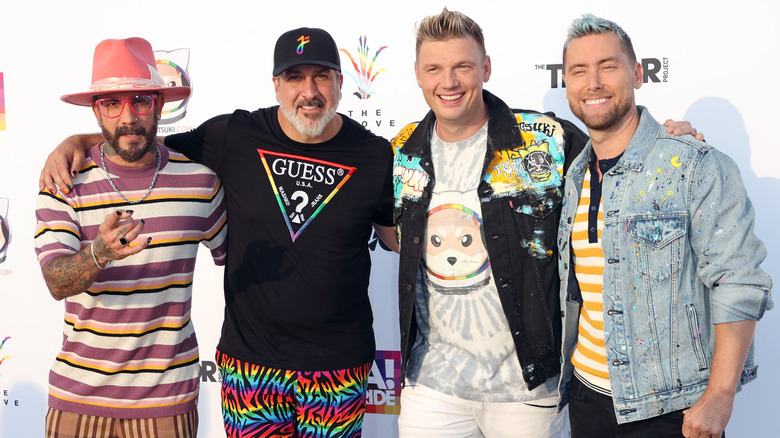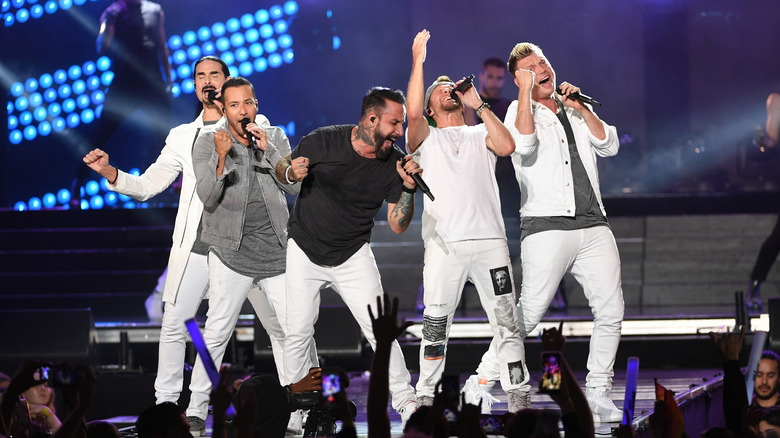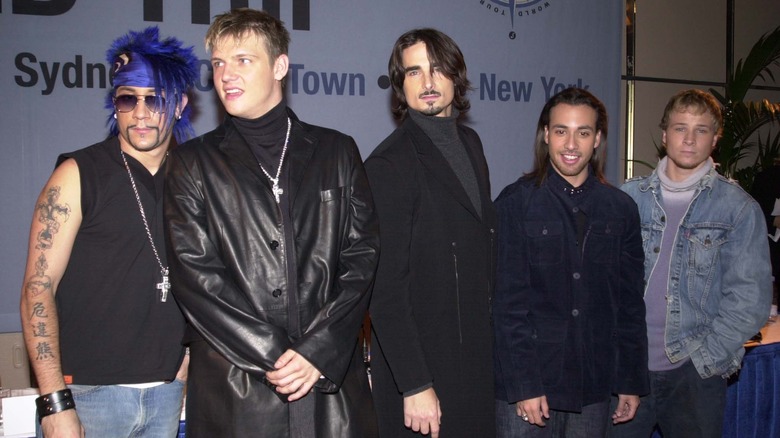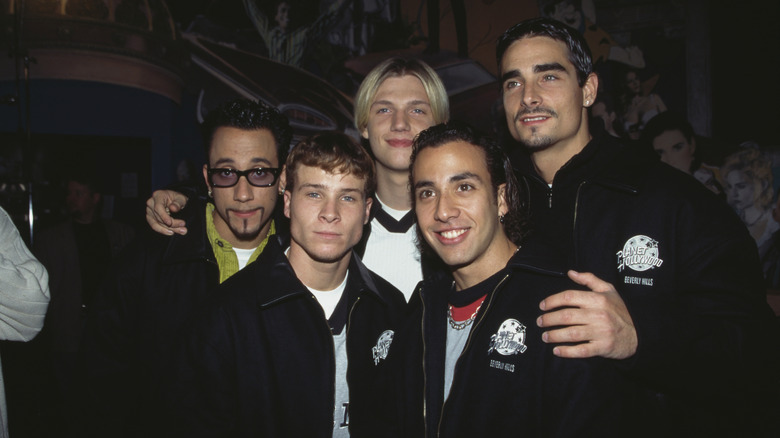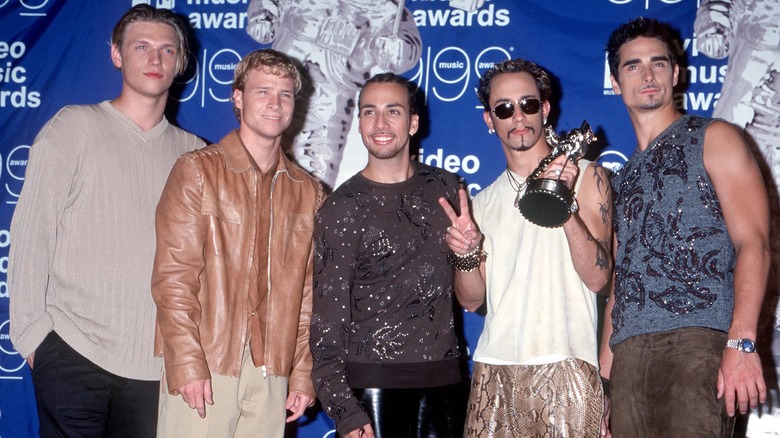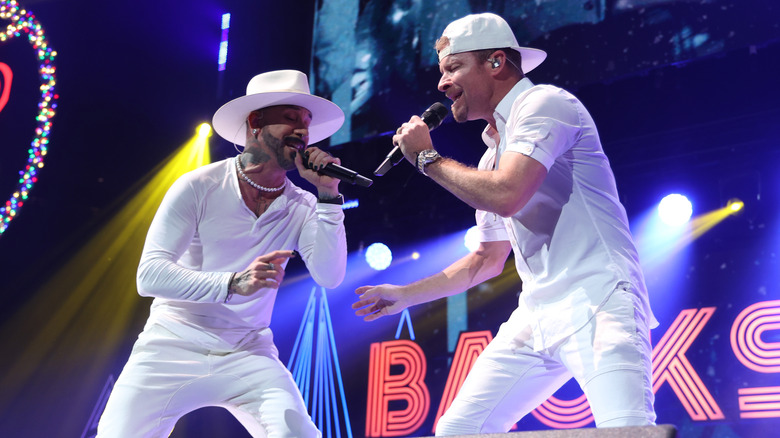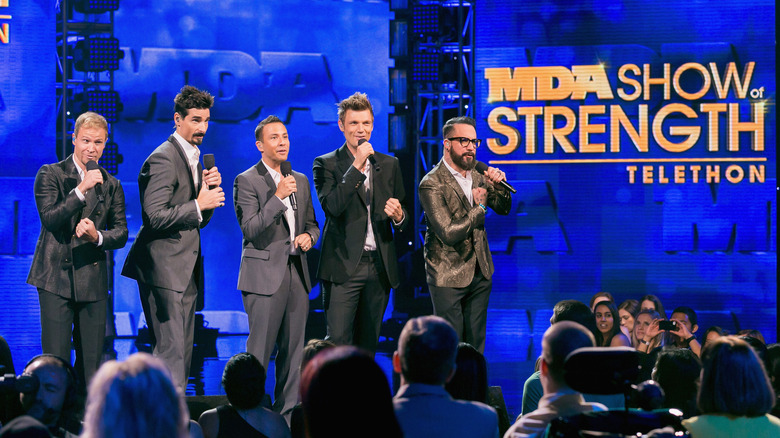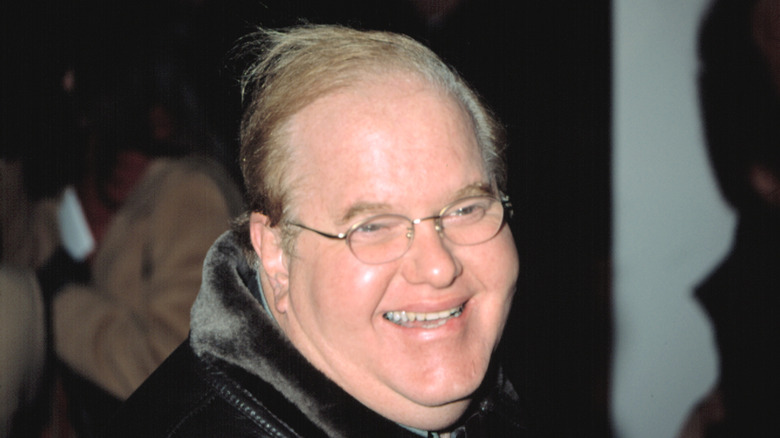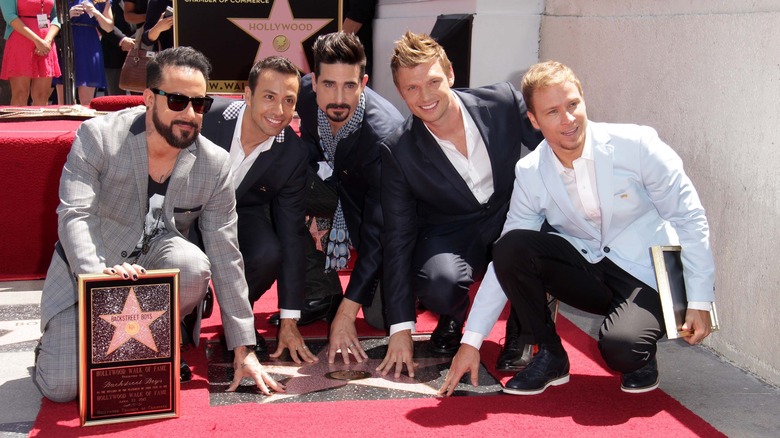What Only Adults Notice About Backstreet Boys
Backstreet Boys came onto the scene in the 1990s and kicked off one of the most successful boy band runs ever. AJ McLean, Howie Dorough, Nick Carter, and cousins Kevin Richardson and Brian Littrell were assembled by their former manager Lou Pearlman in 1993, and within a few years they were topping the charts and touring the world. Backstreet Boys went on to become one of the best-selling boy bands of all time with millions of fans, including big-name celebrities like Blake Lively, Amy Schumer, and Drake, who even joined them onstage as a sixth member to perform their hit, "I Want It That Way" in 2022.
The group has been going strong for 30 years, and they remain as committed as ever to the future. Even though their target audience was originally teens and tweens, the group is still releasing music and touring, bridging the gap between boy band obsession and adult fandom.
Littrell told People that keeping the dynamics of a band strong for so long is "harder than a marriage, much harder. I mean, have you ever been married to four dudes?" Being in the spotlight for decades means their original fan base has grown into adulthood, and as they age and new fans come aboard, it's easier to see the band through an adult lens. Here's what might not have been obvious about their music for their young fans in the '90s.
Their name sends a mixed message
When Backstreet Boys debuted, the group's name was equal parts eyebrow-raising and wholesome. The origin of the name was a popular hangout spot in Orlando called Backstreet Market, but few people recognized the connection. Instead, the name had a "bad boy" connotation, implying that they were from the backstreets and were going to croon about some sexier topics. The word "Boys" was also a bit misleading to use, considering that three out of the five members were already adults when the band formed in 1993.
When they debuted in the late '90s, Backstreet Boys maintained a clean-cut but mildly edgy image that helped them attract millions of teen and pre-teen fans. However, by 2000 they were all well into adulthood and two of the members, Richardson and Littrell, had gotten married, signaling the group's inevitable maturation from teen heartthrob status into manhood. In 2005, when they released the album "Never Gone," it was a bold move away from their iconic teen pop sound toward an adult contemporary style, and their lyrics began to feel more "Backstreet" and less "Boy." However, the band name is here to stay, while Backstreet Boys continue to perform and tour into their 40s and 50s.
The rivalry with *NSYNC wasn't real
In the late 1990s, you couldn't miss the headlines surrounding the alleged discord between Backstreet Boys and their rivals, *NSYNC, and there was mild drama early on between *NSYNC's Chris Kirkpatrick and AJ McLean. "I wanted to punch A.J.'s lights out for a little while," Kirkpatrick told Billboard. "I was dating a girl, I broke up with her and he started dating her."
But the singer admitted that they settled things over beers before the dispute got physical. "I think boy band fights are in the same realm as hockey fights. You fight when you're on TV, but then when you're not, you get a beer together. Now we're really good friends," Kirkpatrick explained.
Instead, the bands both vied for #1 hits and concert ticket sales, pushing each other to achieve further success. The Boys' album "Black and Blue" and *NSYNC's "No Strings Attached" were in direct competition, and in 2001, *NSYNC's concert tickets went on sale a week before Backstreet Boys, which the media portrayed as an intentional move. The truth is that the beef was between the bands and their shared manager, Lou Pearlman. According to The New York Times, when Pearlman launched *NSYNC, Backstreet Boys made it clear that they were angry because they believed it was a major conflict of interest to simultaneously manage both immensely popular groups. But Pearlman brushed off their complaints, likening his decision to launching competitive soda brands or burger chains.
The group's innuendos were strong
Backstreet Boys were an explosion of chart-topping songs, iconic dance moves, music videos, concert experiences, and merchandise — so it's easy to understand how young fans were too swept away by it all to realize how sexual some of their lyrics were. However, some fans were captivated by Backstreet Boys' slightly darker and more mysterious image when compared to other boy bands of the time.
In the song "Get Down (You're the One for Me)," the band played the double entendre game. They invited the object of their affection to the BSB "fun factory" and asked her to "get down on your knees, trying to scream or touch me please." One could explain this as a description of an excited fan at a show, but this song isn't so innocent.
In their song "Beautiful Woman," The Boys started out singing their typical syrupy sweet lyrics, but they went for a more direct approach after the first chorus when they sang, "I guess we'll know just what to do, When you're lookin' to fool around, It's too late to stop me, I know we're gonna get down," leaving no question about what they were referring to. They also unabashedly told the story of a favorite party girl in their song "Poster Girl," singing, "She likes to party in the back seat, under the bridge on the Brooklyn side," making any adult listening blush.
Their song about cheating showed a darker side
Fans came to know Backstreet Boys through wholesome, feel-good songs like "As Long As You Love Me," "Quit Playing Games With My Heart," and "Show Me The Meaning Of Being Lonely." But in 2000, they released a decidedly adult-themed single named "The Call" from the 2000 album "Black and Blue."
The song told the story of a call with bad reception, and a boyfriend giving his girl the brush-off. When The Boys sang "I can't take it back, what's done is done, One of her friends found out that she wasn't my only one," it was clear to adult fans that they were telling a story about cheating, the ensuing breakup, and regret that followed.
The lyrics were a stark departure from the band's tame pop image up to that point. But Smooth Radio ranked it as one of the group's 10 best songs of their catalog, thanks to its catchiness. However, this was quite the claim considering that the song peaked at No. 52 on the Billboard Top 100 and only stayed on the charts for six weeks.
Their age gap was huge when they debuted
Although it doesn't seem like a big deal now, the members of Backstreet Boys have an age gap of eight years from youngest to oldest, and it was noticeable to adults who were paying attention when they debuted. Nick Carter was the youngest member at just 12 when he auditioned and 13 when the group was formed. There's no doubt he was able to carry his own in Backstreet Boys and he often took the lead in their songs. But Carter looked and sounded noticeably younger than the other men of the group during their early interviews and appearances.
On the other end of the spectrum, Kevin Richardson was 21 when the group was formed. His facial hair set him apart as one of the oldest members, and fans identified him as the designated adult of the group. These days, the band members are all dads, and their age difference is no longer as noticeable. Now, all the members find the dance moves of their youth too challenging to replicate as they continue to tour 30 years on. "We used to be in a standing position, drop to our knees and then — with no knee pads on — and then pop right back up," Richardson told Entertainment Tonight. "We don't do that anymore. We don't do kip-ups anymore, when you're laying on your back and kip-up. We don't do splits anymore," he explained.
No one knows what I Want It That Way is about
Most adult fans have come to terms with the fact that the lyrics for Backstreet Boys' hit song "I Want It That Way" don't actually make sense. What starts out as a simple love song drops into a chorus that confuses things. They sing, "Ain't nothing but a heartache, tell me why, ain't nothing but a mistake, tell me why, I never wanna hear you say I want it that way."
Perhaps everyone has been wondering about the meaning of the song since it was released. But Chrissy Teigen represented all of us when she finally questioned the confusing lyrics in a hilarious 2018 tweet. "He doesn't wanna hear it because he is the one that wants it that way? He wants to be the one to say it? Also what is 'it'?" she asked.
Then, the official Backstreet Boys Twitter account weighed in on the conversation. "Don't wanna hear you say that you want heartaches and mistakes ... or to be 2 worlds apart. We don't want you to want "it" that way – that's the way we want it ... for you to not want it that way." The band didn't explain things any further to Entertainment Tonight, simply letting their fans know that it's a "riddle" that "means something different to everyone." In the end, no one really seems to care what it means — the song's video joined YouTube's Billion Views Club in 2021.
Members of the band had real-life problems
At the height of their success, the band's shiny pop image hid the real-life problems that the group endured while they were hustling to stay on top. Brian Littrell was born with a ventricular septal defect, also known as a heart murmur, which had affected him his entire life and nearly killed him when he was five years old. He underwent surgery to correct the condition in 1998 while the group was simultaneously performing at a frenetic pace.
According to The New York Times, Littrell was heartbroken when management lacked sensitivity toward his condition and suggested he prioritize the band's schedule over his health. "I remember management at the time saying, 'Can't you postpone it so we can finish the tour?”' Kevin Richardson explained in 2002. ”And this just hurt Brian so much because he was like, 'Dude, this is my heart.”'
AJ McLean and Nick Carter both struggled with substance abuse, with McLean entering rehab in 2001 to kick his alcohol addiction. Since then, he's been in and out of rehab battling his demons with alcohol and drugs, but McLean has been sober since 2019. It took longer for Carter to come to terms with his addictions, despite the band urging him to get the abuse under control. He began to get clean in 2008 when Carter was diagnosed with cardiomyopathy, a weakening of his heart from habitual drug and alcohol abuse.
Backstreet Boys were givers
Their young fans may not have picked up on the fact that the members of Backstreet Boys were incredibly charitable with their time and money at the height of their success. The group took on several causes, ranging from children's hospitals to research and treatment for diabetes and lupus. "Anytime we can do anything for charity, we are always going to be here," McLean told ABC 6 in 2022.
In addition to donation campaigns, the band did what they do best when they joined forces with *NSYNC and Nick Carter's late brother, Aaron, in 2001 to release a charity single called "Let the Music Hear Your Soul," which benefitted the Nordoff-Robbins Music Therapy Foundation. That same year, McLean donated $1 million of his personal fortune and started a foundation to help raise money for diabetes research and VH1's Save the Music Foundation.
Howie Dorough focused his charitable efforts on raising money for lupus research after he lost his sister, Caroline, to complications from the auto-immune disease in 1998. "We have been doing a lot of charity work to promote as much awareness of the lupus disease and the foundation," Dorough told CBS in 2005 of his Dorough Lupus Foundation. Thirty years later they continued to make a charitable impact. In 2022, Backstreet Boys created an opportunity for fans to win an all-inclusive trip and experience with the band to benefit children's charity Point Hope, Inc.
The group had to fight to get what they deserved from the industry
Despite being one of the best-selling artists of the late 1990s, Backstreet Boys were not rolling in cash as a result of their juggernaut status, and, similar to other exploited musical acts, their manager was to blame. In 1998, while their teen fans were enjoying the band's worldwide explosion and totally oblivious to the drama, The Boys were suing Lou Pearlman, claiming that they had only received $300,000 even though their 1997 album "Backstreet Boys" sold 28 million copies worldwide.
In his contract with the band, Pearlman had named himself as a sixth member of the group, allowing him to keep 17% of the band's profits. He was also collecting an additional 15% commission fee for managing the group and pocketing a lion's share of what the group was bringing in. All the while, he blamed the cost of running the band to explain the unaccounted-for income.
According to The New York Times, after parting ways with Pearlman, the band joined a new management company, The Firm, and successfully sued Pearlman until he renegotiated their contract. In the end, though, the group felt that negotiating with the industry led to a loss of control over their careers. They were dissatisfied with how management pressure affected their creative freedom while they were making the album "Black and Blue." They also felt that letting management negotiate their tour ended up alienating fans with exorbitant ticket prices.
The Boys had one particularly cringy song that they also hated
There's one song that pretty much everyone agrees pulled Backstreet Boys far away from their comfort zone. The 1997 album "Backstreet's Back" included a song called "If You Want It to Be Good Girl (Get Yourself a Bad Boy)" that detailed all the reasons a girl might prefer a bad boy. Adult fans knew when they sang "If you wanna make it last, gotta know just who to ask," that they were not referring to making a long-term relationship last.
In 2021, AJ McLean admitted to Billboard that the song is the band's least favorite in their entire catalog. They hated the lyrics pretty much as soon as the song was recorded, and they especially detest them now. "But now we know that it's toxic for 5-year-olds," McLean explained. "I have an almost 5-year-old, I don't want that for her." And to think, Nick Carter was only 17 when the song was released!
Despite the band's disconnect with the tune, fans still debate the merits of the song in comment threads. One YouTube commenter stated, "idk why the backstreet boys hate this song so much its such a bop," while another commenter confirmed the band's worst nightmare: "I was 5 years old, zero context about sex, and this song made me feel things..."
